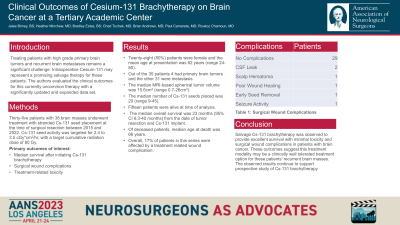Clinical Outcomes of Cesium-131 Brachytherapy on Brain Cancer at a Tertiary Academic Center
Clinical Outcomes of cesium-131 Brachytherapy on Brain Cancer at a Tertiary Academic Center
Friday, April 21, 2023

.jpeg.jpg)
Jalee Birney, BS (she/her/hers)
Medical Student
University of Kansas School of Medicine
ePoster Presenter(s)
Introduction: Treating patients with high grade primary brain tumors and recurrent brain metastases remains a significant challenge. Intraoperative Cesium-131 may represent a promising salvage therapy for these patients. The authors evaluated the clinical outcomes for this currently uncommon therapy with a significantly updated and expanded data set.
Methods: Thirty-five patients with 38 brain masses underwent treatment with stranded Cs-131 seed placement at the time of surgical resection between 2015 and 2022. Cs-131 seed activity was targeted for 2.4 to 3.5 cGy*cm2/hr, with a target cumulative radiation dose of 80 Gy. The primary outcomes of interest were median survival after initiating Cs-131 brachytherapy, surgical wound complications, and treatment-related toxicity.
Results: Twenty-eight (80%) patients were female and the mean age at presentation was 62 years (range 24-80). Out of the 35 patients 4 had primary brain tumors and the other 31 were metastasis. The median MRI-based spherical tumor volume was 15.6cm3 (range 0.7-26cm3). The median number of Cs-131 seeds placed was 20 (range 9-45). Fifteen patients were alive at time of analysis. The median overall survival was 23 months (95% CI 6.3-40 months) from the date of tumor resection and Cs-131 implant. Of deceased patients, median age at death was 66 years. Surgical wound complications included pseudo-meningocele with CSF leak (2), scalp hematoma (1), poor wound healing (1), early seed removal due to radiation necrosis (1) and seizure activity followed by wound debridement and free-flap corrective surgery (1). Overall, 17% of patients in this series were affected by a treatment related wound complication.
Conclusion : Salvage Cs-131 brachytherapy was observed to provide excellent survival with minimal toxicity and surgical wound complications in patients with brain cancer. These outcomes suggest this treatment modality may be a clinically well tolerated treatment option for these patients' recurrent brain masses. The observed results continue to support prospective study of Cs-131 brachytherapy.
Methods: Thirty-five patients with 38 brain masses underwent treatment with stranded Cs-131 seed placement at the time of surgical resection between 2015 and 2022. Cs-131 seed activity was targeted for 2.4 to 3.5 cGy*cm2/hr, with a target cumulative radiation dose of 80 Gy. The primary outcomes of interest were median survival after initiating Cs-131 brachytherapy, surgical wound complications, and treatment-related toxicity.
Results: Twenty-eight (80%) patients were female and the mean age at presentation was 62 years (range 24-80). Out of the 35 patients 4 had primary brain tumors and the other 31 were metastasis. The median MRI-based spherical tumor volume was 15.6cm3 (range 0.7-26cm3). The median number of Cs-131 seeds placed was 20 (range 9-45). Fifteen patients were alive at time of analysis. The median overall survival was 23 months (95% CI 6.3-40 months) from the date of tumor resection and Cs-131 implant. Of deceased patients, median age at death was 66 years. Surgical wound complications included pseudo-meningocele with CSF leak (2), scalp hematoma (1), poor wound healing (1), early seed removal due to radiation necrosis (1) and seizure activity followed by wound debridement and free-flap corrective surgery (1). Overall, 17% of patients in this series were affected by a treatment related wound complication.
Conclusion : Salvage Cs-131 brachytherapy was observed to provide excellent survival with minimal toxicity and surgical wound complications in patients with brain cancer. These outcomes suggest this treatment modality may be a clinically well tolerated treatment option for these patients' recurrent brain masses. The observed results continue to support prospective study of Cs-131 brachytherapy.
